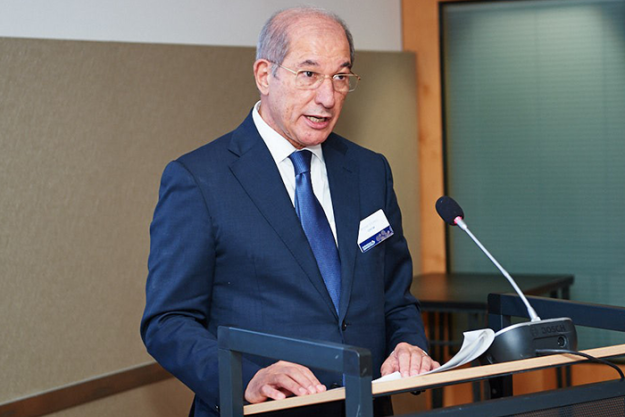
The Director-General of the Organisation for the Prohibition of Chemical Weapons (OPCW), Ambassador Ahmet Üzümcü
THE HAGUE, Netherlands — 27 October 2017 — The Director-General of the Organisation for the Prohibition of Chemical Weapons (OPCW), Ambassador Ahmet Üzümcü, spoke about the outlook for OPCW’s cooperation with industry at the International Council of Chemical Associations (ICCA) Board meeting in Vienna, Austria on 27 October.
Ambassador Üzümcü delivered a statement titled, “Twenty Years of the OPCW: Its Achievements, Future Outlook and Cooperation with Industry”.
Commenting on the success of the Chemical Weapons Convention – as the treaty marks the twentieth anniversary of its entry into force throughout 2017 – the Director-General described the partnership with the chemical industry as a “pillar of that success” and how “building bridges with organisations such as ICCA” is vital to OPCW’s future endeavours.
At a time when the OPCW is shifting its activities from verifying the destruction of chemical weapons to preventing their re-emergence, Ambassador Üzümcü encouraged industry representatives to consider new perspectives. He also said: “Our partnership with the chemical industry has been a pillar of that success and building bridges with institutions such as the ICCA is as vital to our future endeavours as it ever has been. Amidst the shift in focus away from stockpiles to preventing their re-emergence, the OPCW’s cooperation with the industry will assume greater significance, especially in chemical safety and security.”
The ICCA Board members expressed their willingness to continue to work together for the use of chemistry to the benefit of humankind.
During his visit to Vienna, the Director-General also met with the Director General of the International Atomic Energy Agency, Mr Yukiya Amano, and the Executive Secretary of the Comprehensive Nuclear-Test-Ban Treaty Organization, Mr Lassina Zerbo.
Background
As the implementing body for the Chemical Weapons Convention, the OPCW oversees the global endeavour to permanently eliminate chemical weapons. Since the Convention’s entry into force in 1997 – with its 192 States Parties – it is the most successful disarmament treaty eliminating an entire class of weapons of mass destruction.
Over 96 per cent of all chemical weapon stockpiles declared by possessor States have been destroyed under OPCW verification. For its extensive efforts in eliminating chemical weapons, the OPCW received the 2013 Nobel Prize for Peace.
